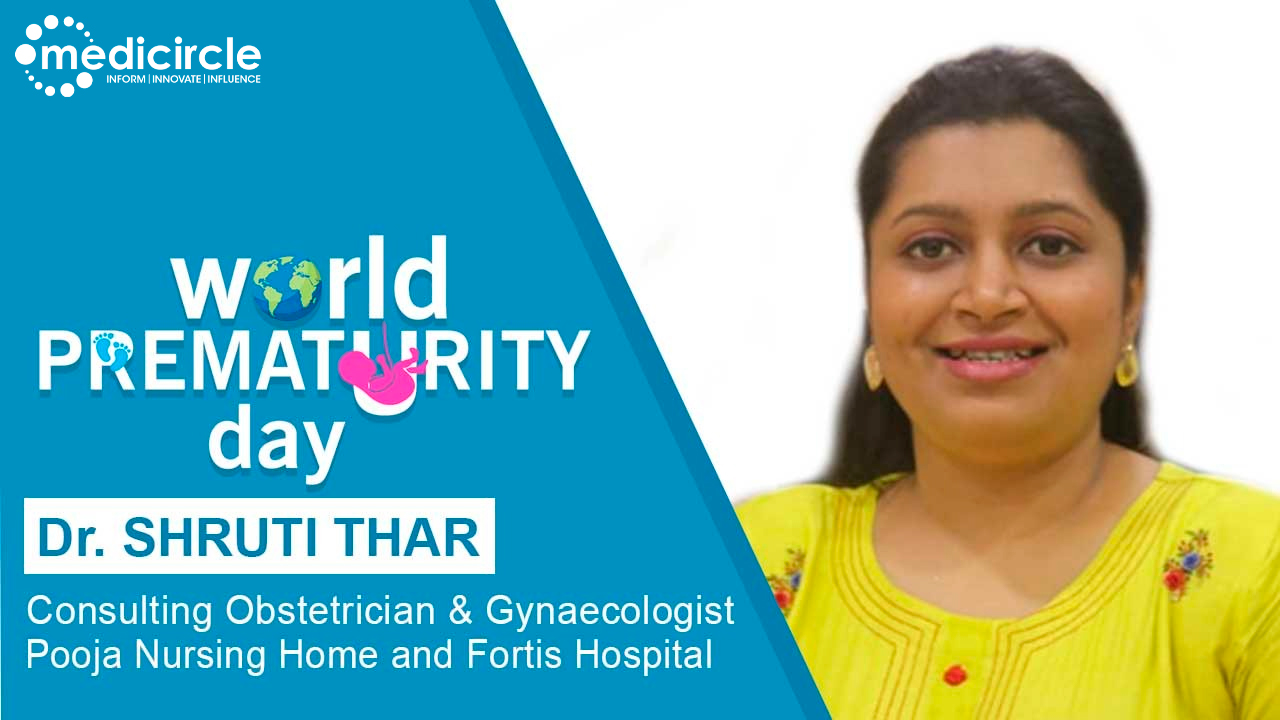World Prematurity Day is celebrated on November 17th, to raise awareness of the challenges and burden of preterm birth globally. The day was initiated by EFCNI and partnering European parent organizations in 2008. Preterm birth (premature birth) is a significant public health problem across the world because of associated neonatal (first 28 days of life) mortality.
According to WHO, every year about 15 million babies are born prematurely around the world and that is more than one in 10 of all babies born globally. Of the 15 million babies born preterm globally, 1/5th are born in India. In India, out of 27 million babies born every year, 3.5 million babies born are premature.
On the occasion of World Prematurity Day, we at Medicircle are conducting an exclusive awareness series wherein we will be featuring experts in this field to understand and create more awareness about premature birth
Dr. Shruti Thar is working in Pooja Nursing Home and Fortis Hospital as a Consultant Obstetrician. She has more than 9 + years of experience in Obstetrics and Gynecology. She has worked and associated with many hospitals like Breach Candy in South Mumbai and Wadia Hospital. She has successfully conducted more than 500+ deliveries and more than 300+ cesarean or C sections.
Causes of Premature birth
Dr. Shruti Thar says, “ The cause of premature birth is -
Lack of prenatal care Infections like vaginal infections Multiple pregnancies like triplets Increase in amniotic fluid Maternal conditions - uncontrolled BP, diabetes Premature rupture of membranes High-risk factor Lack of proper monitoring Early preterm delivery where baby birth is at 28- 32 weeks Late preterm delivery where baby birth is 32 - 34 weeks
Care for a premature baby in the hospital
Dr. Shruti says, “This baby needs specific care which is as follows-
Under the supervision of a pediatrician expert Warm room 26 - 28 degrees of room temperature during delivery. Cover the baby snugly if provisions are not available After delivery place the baby on the mother with skin to skin method Avoid hypoglycemia in newborn babies Babies with more than 1 .6 kg can do breastfeeding Low birth weight below 1.6 kg, do express breast milk Do not keep baby hungry Low immunity- avoid infections Avoid handling and carrying a baby by multiple people Sanitize hands before handling baby due to low immunity Minimal contact and touch.”
Premature baby care at Hospital
Dr. Shruti says, “Premature baby below 1.6 kg need special care at the hospital as follows-
NICU care - Neonatal Intensive Care Unit 10 days under observation Lung maturity should be checked - Injections can be taken by the mother for pregnancy Oxygen support and surfactant to avoid breathing issues Steady heart rate.”
Post-discharge care for premature babies
Dr. Shruti informs, “The babies need extra care as they are weak when born. The post-discharge care for such babies at home are -
Proper feed Keep wrapped and covered to maintain temperature Cover their head and limbs with socks etc Make sure the baby’s surroundings are clean and healthy Kangaroo care method with skin to skin contact.”
India and neonatal care for premature babies
Dr. Shruti informs, “India is a populated country. There is a lack of accessibility and availability along with affordability. There is an unmet need for tertiary care for NICU. This is a drawback of a developing country. Baby needs protection and will well develop hospital care.”
(Edited by Dr.Rati Parwani)

 Premature babies need extra care and attention called NICU care. Every mother should also take care of their baby post discharge which calls for extra attention. The baby is born in the world to fight. Helping the premature babies with special care will allow them to fight out the world.
Premature babies need extra care and attention called NICU care. Every mother should also take care of their baby post discharge which calls for extra attention. The baby is born in the world to fight. Helping the premature babies with special care will allow them to fight out the world.






.jpeg)
.jpeg)
.jpeg)
.jpeg)
.jpeg)
.jpeg)
.jpeg)
.jpeg)






.jpeg)



.jpeg)
.jpeg)







.jpg)

